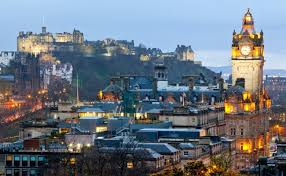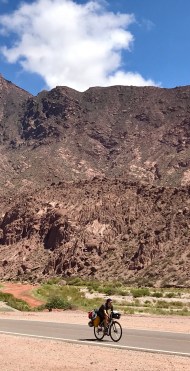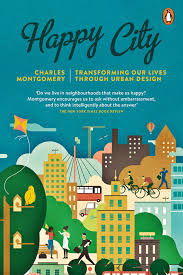I’ve often struggled in cities. Yet it was in and around a city – yes, a big one, London – where I was born and subsequently spent a huge chunk of my life (some 20 years). Life in a city was all I knew (and still is in many ways) and I’ve learnt to survive in them. But now I’ve seen other ways I can be I don’t want to just survive – I’d like to thrive and for me thriving in a city takes something else.
It was not long ago that I left Cusco (Peru’s 7th largest city with some 400,000 people) and my time there has inspired me to write this blog post. A blog post which has been festering within me for some months ever since I arrived in Buenos Aires (according to some lists the world’s 15th largest city with some 11 million people) to begin cycling in South America.
I spent 2 weeks in Cusco – much longer than I had anticipated. This was not simply because of a need for physical rest in what has been at times an arduous journey but because it is a city where I felt nourished to my core. The people I met and the experiences I had there led to a deeper understanding and acceptance of my-self (important aspects of happiness). In the end I found it difficult to leave and, I might even be able to say with confidence that, it is a city where I could live and be happy.
Did I just get lucky?
Perhaps I just happened to meet the “right” people and go to the “right” spaces at the “right” time. As with everything there is always some luck involved but knowing what I need in the first place – the presence of nature, not too big to get lost but not too small to run into familiar faces or hold a small population of people on a similar path of self-understanding and self-acceptance, a rich historically steeped culture, and a sense that there is some consciousness around food – and there being such an abundance of these things certainly helps. Cusco had all of these and so luck or no luck I would have found what I needed eventually.

It is not often I find the things that help me thrive in cities and it is from not having these things that has helped me appreciate when I do have them. I found them in abundance in the last city I lived – Edinburgh, Scotland. There I found it easy to thrive – it seemed easy for me to connect with people and keep nature close to my heart. I miss Edinburgh deeply. Edinburgh became a home in a way I never experienced growing up in London. I also think Grenada, Spain, which is a city I’ve had the pleasure of visiting on several occasions, could be a city where I’d thrive.
The struggle before the struggle As I pedal my way across the world on my happiness pilgrimage to Bhutan most of my time on the bike so far has been either in the countryside, atop mountains, or stopping off in small to medium towns for a little rest. But every so often I find myself approaching a big city. My struggle can often begin before I’ve even arrived. I feel it in my body first – a tension – I notice my vulnerability on the road as traffic gets denser. Cars, busses, and lorries get closer to me – sometimes too close to the extent where I may then verbally express something out of frustration at seemingly being disregarded or ill-considered by other road users. The use of horns becomes more frequent. There is a pressure and it’s easier to get physically lost and make mistakes on the road. But much of what I experience is a norm that is difficult not to personally contribute to – possibly born of frustration at being amongst others frustration and wanting to be elsewhere than where we all are. It’s not just entering a city on a bike when I have experienced such tension.
As I pedal my way across the world on my happiness pilgrimage to Bhutan most of my time on the bike so far has been either in the countryside, atop mountains, or stopping off in small to medium towns for a little rest. But every so often I find myself approaching a big city. My struggle can often begin before I’ve even arrived. I feel it in my body first – a tension – I notice my vulnerability on the road as traffic gets denser. Cars, busses, and lorries get closer to me – sometimes too close to the extent where I may then verbally express something out of frustration at seemingly being disregarded or ill-considered by other road users. The use of horns becomes more frequent. There is a pressure and it’s easier to get physically lost and make mistakes on the road. But much of what I experience is a norm that is difficult not to personally contribute to – possibly born of frustration at being amongst others frustration and wanting to be elsewhere than where we all are. It’s not just entering a city on a bike when I have experienced such tension.
Constant threats and “no time” to breathe into what is important

This tension I feel event before I arrive might stay with me when I get to the city. Cities can be busy places – all these people on the move to somewhere quickly. If I’m not careful, and to be honest I rarely am, then I become a busy person too and I don’t always take the time to breathe and check in with my-self. Around every corner I’m conscience of a threat to staying balanced – maybe it is a metal machine hurtling past me, loud strange noises in all directions, a bombardment of strangers peering eyes that never settle long enough upon me to connect meaningfully and unthreateningly. The sort of things I became accustomed to growing up in London but that nevertheless influenced me. It is my experiences outside of cities – and different environments generally – that have helped me appreciate that much of who I sometimes think I am, and how I react and behave, is not actually me – it’s often just a case of survival.
When it comes to our happiness (however defined) it is our relationships with others (building trust and having people we can rely on), our physical and mental health (helped by having access to nature), and our personalities (which can and do develop over-time), that are the most important determinants. The research seems quite clear on this to me but so often these things can be sacrificed at the expense of personal and national financial interests.
I not so sure our cities are cultivating a focus on these important factors. As I gaze on some cities I have often wondered whether they are just places where some people come to “try” to make money at the expense of happiness. London, although by far the richest city in the UK, is by some accounts also the least happy.

So often it seems to me that cities are dominated by economic interests. Life in the city is normally much more expensive. This may mean that people might need to take on longer commutes for jobs that afford them even a basic life and they may need to work longer for it too. In a time-scarce environment I am aware that there is a greater temptation for buying conveniences. Status concerns may also be a bigger concern with more attention given to what others do and do not have more. The need (or desire) for money has a way of driving people in their daily lives in cities in a way it does not seem to elsewhere – consciously or unconsciously. Just to look at the skylines of many cities – dominated by large commercial buildings – may distract us from what is really important in life.
We can design happier cities
 We can sometimes make personal choices that bring us more happiness in difficult conditions. We can choose to use active forms of transport or make use of flexible working patterns (if they exist). However, we the people can also demand that are cities are designed in ways that have been backed by research that are conducive to greater happiness. The Happy City project in the UK is a great example of this and the Happy City Index has been designed to track a city’s success in providing the conditions that create ‘sustainable wellbeing’. There are also examples where leadership has resulted in substantial changes to cities that have produced greater well-being.
We can sometimes make personal choices that bring us more happiness in difficult conditions. We can choose to use active forms of transport or make use of flexible working patterns (if they exist). However, we the people can also demand that are cities are designed in ways that have been backed by research that are conducive to greater happiness. The Happy City project in the UK is a great example of this and the Happy City Index has been designed to track a city’s success in providing the conditions that create ‘sustainable wellbeing’. There are also examples where leadership has resulted in substantial changes to cities that have produced greater well-being.
But until we re-define and re-design what our major cities are for now, becuase I am fortunate to have the capacity to move and I am not too fearful to do so, I will keep orientating myself toward the few cities – like Cusco, like Edinburgh, like Grenada – that naturally seem to remind me to slow down and take the time to breathe and make connections with others. Cities that remind me that I am of nature rather than encourage me to think I need to obtain some sort of dominion over nature. Cities where I feel whole.

- I felt whole here – mountains close at hand, not too big, not too small, a rich history, easy access to healthy food.